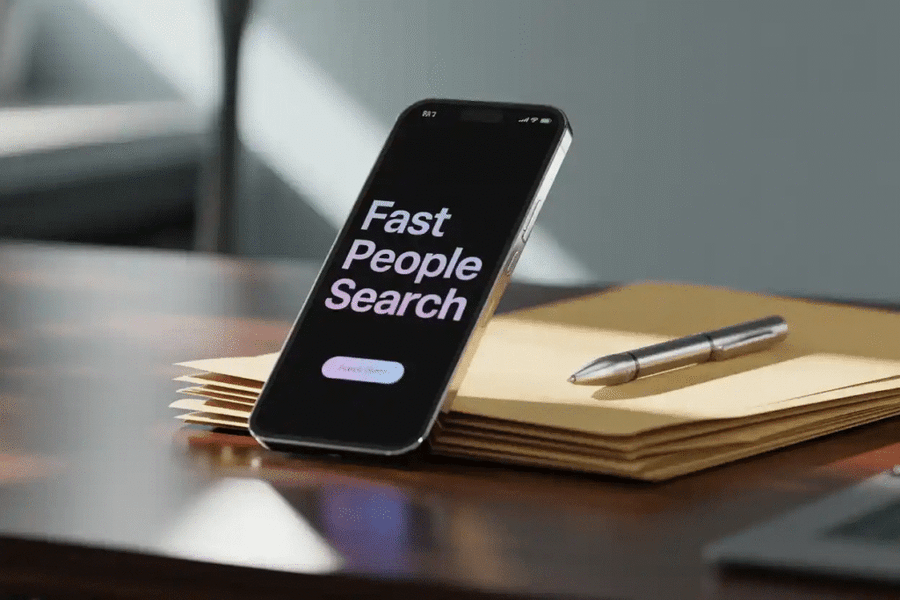
Introduction
Imagine finding a long-lost friend or verifying someone’s identity in mere seconds. Fast people search makes this possible, harnessing the power of public records and digital data to deliver instant results. These online tools simplify locating individuals, offering details like addresses, phone numbers, and more with just a few clicks.
Whether you’re reconnecting with loved ones, vetting a business contact, or ensuring personal safety, fast people search is a game-changer. However, its power demands responsibility. This comprehensive guide explores how fast people search works, its benefits, risks, and ethical use. Dive in to unlock its potential while safeguarding privacy and navigating its complexities.
What Is Fast People Search?
Fast people search refers to online platforms that quickly aggregate public data to locate individuals. These services compile information from sources like government records, social media, and public directories. By entering a name, phone number, or address, users can uncover details such as current residences, contact information, or family connections.
Unlike traditional methods like phone books, fast people search delivers results instantly, making it ideal for personal and professional needs. However, users must approach these tools ethically, as they can raise privacy concerns if misused. Available in free and paid versions, fast people search is accessible to all.
How Fast People Search Works
Fast people search platforms operate by tapping into extensive databases of public and online information. Users input a query—such as a name, phone number, or address—and the system uses advanced algorithms to match it with relevant data. Sources include voter registrations, property records, court documents, and social media profiles.
The results, delivered in seconds, may include addresses, phone numbers, emails, or even criminal records. Some platforms offer reverse lookups, identifying individuals from partial information like a phone number. Consequently, the process is efficient, though accuracy depends on data quality. Always verify results to ensure reliability.
Data Sources
Fast people search relies on diverse data sources to provide comprehensive results:
- Government Records: Voter lists, property deeds, marriage licenses, and court filings.
- Social Media: Public profiles on platforms like LinkedIn, Facebook, or Twitter.
- Public Directories: Phone books, business listings, and other accessible databases.
- Data Aggregators: Brokers that collect and sell personal information.
These sources are publicly available, but their recency and completeness vary, affecting result accuracy.
Technology Behind Fast People Search
The technology powering fast people search includes:
- Data Aggregation: Software collects and organizes data from multiple sources.
- Search Algorithms: Systems match queries to database entries for accurate results.
- User Interfaces: Platforms are designed for easy navigation and quick searches.
- Security Measures: Encryption ensures anonymous searches and user data protection.
This technology enables fast, reliable results, making fast people search a powerful tool for users.
Benefits of Fast People Search
Fast people search offers numerous advantages for various scenarios:
- Reconnecting with Loved Ones: Locate old friends or relatives you’ve lost touch with, fostering meaningful connections.
- Verifying Identities: Confirm someone’s identity before online transactions or personal meetings, enhancing safety.
- Background Checks: Employers and landlords use these tools to vet candidates or tenants, ensuring trustworthiness.
- Finding Contact Information: Access phone numbers or emails when traditional methods fail.
- Genealogy Research: Trace family histories by uncovering relatives and historical records.
Additionally, journalists, marketers, and legal professionals benefit from fast people search for research and investigations. Its speed and accessibility make it invaluable, provided it’s used ethically.

Reconnecting with Loved Ones
Imagine wanting to reconnect with a childhood friend or a distant cousin. Fast people search simplifies this by providing current addresses or contact details. For example, entering a name and last known city can reveal where someone lives now, allowing you to send a message or plan a reunion. This capability saves time and effort, making it easier to rebuild relationships that matter.
Verifying Identities
In an era of online interactions, verifying identities is crucial. Fast people search helps confirm whether someone is who they claim to be. For instance, before meeting an online date or hiring a contractor, you can check their background to ensure safety. This reduces risks and builds trust in digital relationships.
Background Checks
Businesses and individuals use fast people search for background checks. Employers can verify a candidate’s criminal history or past employment, while landlords can check a tenant’s rental history. This ensures safer hiring or leasing decisions, protecting both parties from potential issues.
Finding Contact Information
Need to reach someone but lack their current details? Fast people search can uncover phone numbers, emails, or social media profiles. For example, a business owner might use it to contact a potential client, streamlining communication and saving time.
Genealogy Research
For those exploring family history, fast people search is a treasure trove. It can reveal relatives, past addresses, or historical records, helping you build a family tree. This makes it a valuable tool for genealogists and curious individuals alike.
Risks and Ethical Considerations
Fast people search, while powerful, poses risks that users must consider:
- Privacy Invasion: Personal details are accessible to anyone, potentially leading to unwanted attention or harassment.
- Inaccurate Data: Outdated or incorrect information can cause misunderstandings or false assumptions.
- Misuse Potential: Using data for stalking, fraud, or other illegal activities is a serious concern.
- Legal Risks: While accessing public records is legal, misuse can violate laws, depending on jurisdiction.
Ethically, users should only search for legitimate reasons, like reconnecting or verifying identities. Respecting privacy and adhering to local laws ensures responsible use of fast people search.
Privacy Concerns
The accessibility of personal information raises significant privacy issues. Anyone can access your address or phone number, increasing risks like identity theft or unwanted solicitations. For example, a Reddit user noted that fast people search affected their job search by revealing their age to employers. To mitigate this, users should be cautious and consider opting out of these databases.
Legal Implications
Accessing public records is generally legal, as they’re publicly available. However, using the information for illegal purposes, like harassment, is prohibited. Laws like the GDPR in Europe or CCPA in California impose strict rules on data use. Users must understand local regulations to avoid legal consequences when using fast people search.
Popular Fast People Search Platforms
Several platforms lead the fast people search market, each offering unique features:
| Platform | Key Features | Free/Paid |
|---|---|---|
| FastPeopleSearch.com | Name, phone, address searches; reverse lookups | Free basic, paid detailed |
| TruePeopleSearch.com | Comprehensive public records; no signup required | Free basic, paid premium |
| PeopleSearchNow.com | Background checks, social media profiles | Free basic, paid reports |
| Intelius.com | Extensive database, reverse phone lookup | Paid subscriptions |
| BeenVerified.com | Criminal records, court documents | Paid subscriptions |
These platforms prioritize speed and accessibility, but users should verify their credibility and privacy policies before use.
FastPeopleSearch.com
This platform offers free searches by name, phone, or address, delivering results like contact details and relatives. Paid reports provide deeper insights, such as criminal records. Its user-friendly interface and anonymous searches make it popular.
TruePeopleSearch.com
Known for its free, no-signup searches, TruePeopleSearch provides address histories, phone numbers, and more. Its comprehensive database and fast results appeal to users seeking quick, reliable information.
PeopleSearchNow.com
This service focuses on background checks and social media data, offering both free and paid options. It’s ideal for users needing detailed reports for professional purposes.
Intelius.com
Intelius provides extensive reports, including reverse phone and address lookups. Its subscription model suits users needing frequent, in-depth searches.
BeenVerified.com
BeenVerified offers access to criminal records and court documents, making it a go-to for background checks. Its paid plans provide unlimited searches for regular users.
How to Use Fast People Search Effectively
To maximize fast people search, follow these tips:
- Use Accurate Information: Input full names, middle names, or specific locations for better results.
- Try Variations: Experiment with name spellings or partial details if initial searches fail.
- Cross-Check Results: Verify information with other sources to ensure accuracy.
- Leverage Reverse Lookups: Use phone numbers or emails for reverse searches when names are unavailable.
- Stay Ethical: Search only for legitimate purposes, respecting privacy boundaries.
These strategies ensure accurate, efficient results while maintaining ethical standards.
Tips for Accurate Searches
Start with precise details, like a full name and city, to narrow down results. If searching for a common name, add identifiers like age or occupation. For example, searching “John Smith, Chicago, IL” yields better results than just “John Smith.”
Interpreting Results
Results may include multiple profiles, especially for common names. Review details like addresses or relatives to identify the correct person. If data seems outdated, cross-reference with social media or other records to confirm accuracy.

Protecting Your Privacy
Your information may appear on fast people search platforms, but you can protect it:
- Opt Out: Many platforms offer opt-out forms to remove your data. Submit requests directly or use services like OptOutly.com.
- Use Privacy Services: Companies like DeleteMe or Incogni automate data removal from multiple sites.
- Limit Online Sharing: Adjust social media privacy settings and avoid sharing sensitive details publicly.
- Monitor Your Footprint: Regularly search your name to see what’s available and request removals as needed.
- Secure Accounts: Use strong passwords and two-factor authentication to protect online accounts.
These steps reduce your visibility and enhance privacy.
Opting Out of Data Brokers
Data brokers supply information to fast people search platforms. Contact them directly or use services like OptOutly.com to remove your data. This process may require verifying your identity but is effective.
Using Privacy Protection Services
Services like DeleteMe or Incogni specialize in removing personal information from data brokers and people search sites. They streamline the process, saving time and ensuring broader coverage.
Limiting Online Presence
Reduce your digital footprint by limiting what you share on social media. For example, avoid posting your address or phone number publicly. Adjust privacy settings to restrict access to your profiles.
Monitoring Digital Footprint
Periodically search your name on fast people search platforms to see what’s available. If you find unwanted information, take steps to remove it, ensuring your privacy remains intact.
Future of Fast People Search
The future of fast people search is evolving with technology. AI and machine learning will improve result accuracy and speed. However, stricter privacy laws may limit data access, requiring platforms to balance transparency and compliance.
Blockchain could enhance data security, ensuring integrity. Additionally, integration with social media analytics may provide richer profiles. As digital footprints grow, fast people search will become more powerful but also more regulated. Staying informed about these trends ensures responsible use.

Cultural Impact of Fast People Search
Fast people search has transformed how we connect and verify identities. It’s made reuniting with friends or family easier, fostering relationships across distances. However, it’s also sparked debates about privacy, as personal details are readily accessible.
This has led to greater awareness of digital footprints, encouraging users to manage their online presence proactively. Fast people search reflects a balance between connectivity and privacy, shaping modern interactions.
Comparing Fast People Search to Traditional Methods
Compared to traditional methods like phone books or private investigators, fast people search is faster, cheaper, and more accessible. Phone books are outdated and limited, while investigators are costly and time-consuming. Fast people search provides instant, comprehensive results, though it may lack the personalized insights of professional investigations. For most users, its convenience and affordability make it the preferred choice.
Conclusion
Fast people search is a powerful tool for locating individuals quickly, offering benefits like reconnecting with loved ones, verifying identities, and conducting background checks. However, its accessibility raises privacy and ethical concerns. By using reputable platforms, verifying results, and respecting legal boundaries, you can harness its potential responsibly. Protect your own privacy by opting out of databases and limiting online sharing. Ready to explore fast people search? Start today, but always prioritize ethics and privacy in your searches.
FAQs
What is fast people search?
Fast people search uses online platforms to quickly find individuals’ information, like addresses and phone numbers, from public records.
How does fast people search work?
It aggregates data from public records, social media, and directories, matching user queries to deliver instant results.
Is fast people search legal?
Yes, accessing public records is legal, but misuse, like harassment, violates laws. Always check local regulations.
What information can I find with fast people search?
You can find names, addresses, phone numbers, emails, relatives, and sometimes criminal records.
Are fast people search platforms free?
Many offer free basic searches, with paid options for detailed reports.
How can I protect my privacy from fast people search?
Opt out of databases, use privacy services, limit online sharing, and monitor your digital footprint.
Can businesses use fast people search?
Yes, for background checks, client verification, or debtor tracking, ensuring ethical compliance.
How accurate is fast people search?
Accuracy varies; cross-reference results to ensure reliability, as data may be outdated.
What are the risks of fast people search?
Risks include privacy invasion, identity theft, and misuse for illegal purposes.
How do I choose a fast people search platform?
Select platforms with good reviews, transparent privacy policies, and accurate data.






